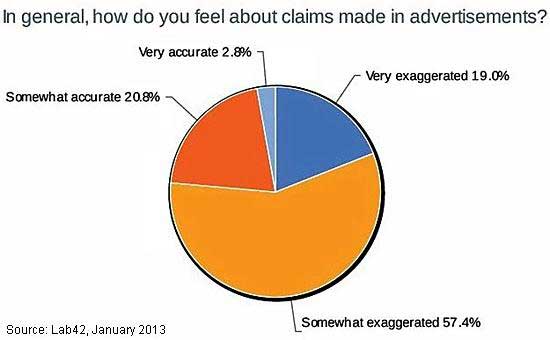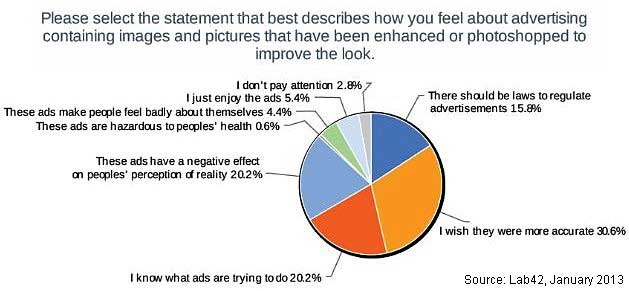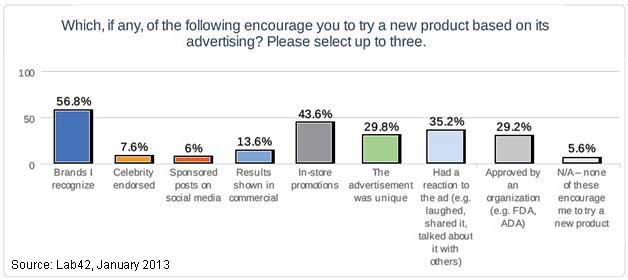More than three in four consumers say most of the claims that brands make in advertisements are exaggerated, according to a study by Lab42.
Specifically, among surveyed consumers, 57.4% say advertising claims are "somewhat exaggerated," and 19.0% say they are "very exaggerated," Lab42 reported.
Only 2.8% of consumers surveyed say the claims in various ads are very accurate:

The new study gauges perceptions of popular forms of advertising such as print, television, Internet, and social media.
Below, additional findings from Lab42.
Comsumers have mixed feelings about ads they view as exaggerated:
- 37.6% say they think ads should be more accurate.
- 32.4% say they "know what ads are trying to do."
- 16.6% say they wish there were laws to regulate ads.
- 8% say they just enjoy the ads they see.
- 5% say they don't pay attention to ads.
Perceptions of Ads by Industry
Consumers tend to be more suspicious of ads in certain industries. Below, the five worst-performing industries in terms of ad perceptions:
- Weight loss: 90.4% say ads are very exaggerated (66.0%) or somewhat exaggerated (24.4%).
- Beauty supplies (e.g., makeup, hair products): 81.0 say ads are very exaggerated (42.0%) or somewhat exaggerated (39.0%).
- Alcoholic beverages: 68.0% say ads are very exaggerated (26.6%) or somewhat exaggerated (41.4%).
- Financial services: 65.6% say ads are very exaggerated (21.0%) or somewhat exaggerated (44.6%).
- Automotive: 65.4% ads are very exaggerated (19.0%) or somewhat exaggerated (46.4%).
Computer-Enhanced Ads
Consumers understand that ads are often retouched with various digital enhancements. More than 9 in 10 (96.4%) say at least one-half of weight-loss ads are computer-enhanced, and 81.0% say the same about ads related to beauty supplies.
Women appear to be more skeptical of claims made in beauty ads. Though only 3% of all respondents say beauty ads are very accurate, 77% of those are men.
Similarly, consumers have mixed views about ads featuring computer-enhanced images:
- 30.6% say they wish ads were more accurate.
- 20.2% say such ads have a negative effect on people's perception of reality.
- 20.2% say they "know what ads are trying to do."
- 15.8% say they wish there were laws to regulate ads.

Importantly, not every aspect of advertising is met with skepticism by consumers: 30.6% say there are products you prefer to purchase because you like the product's advertising.
Respondents identified brands such as Target, Pepsi, Coca Cola, Progressive, and Old Spice as those they purchase based on ads they see.
Success Factors for Ad Conversions
Consumers tend to act on ads when they recognize the brand: 56.8% say they're likely to purchase a new product based on advertising if they already know the brand. Some 43.6% of consumers are motivated by in-store promos, and 35.2% act when ads cause them to react (e.g., laugh about an ad or share it with others).

But brand recognition isn't everything. Despite the prevalence of sponsored posts on social networks today, often from familiar brands, just 6% say they are inclined to try a new product based on this method of advertising.
Make 'Em Laugh
Ultimately, which kinds of advertisements make lasting impressions? Most (71.2%) consumers cite "funny" ads, with 56% of those respondents being women.
Some 11.6% of consumers say they're most likely to remember educational ads, and 7.8% say they remember sexy ads.
About the data: Findings are based on a survey of 500 consumers (half of them women) age 18-64 who work in a broad range of industries and with a broad range of educational backgrounds and income levels. The survey was conducted in the fourth quarter of 2012. Some 49% of respondents were married.




